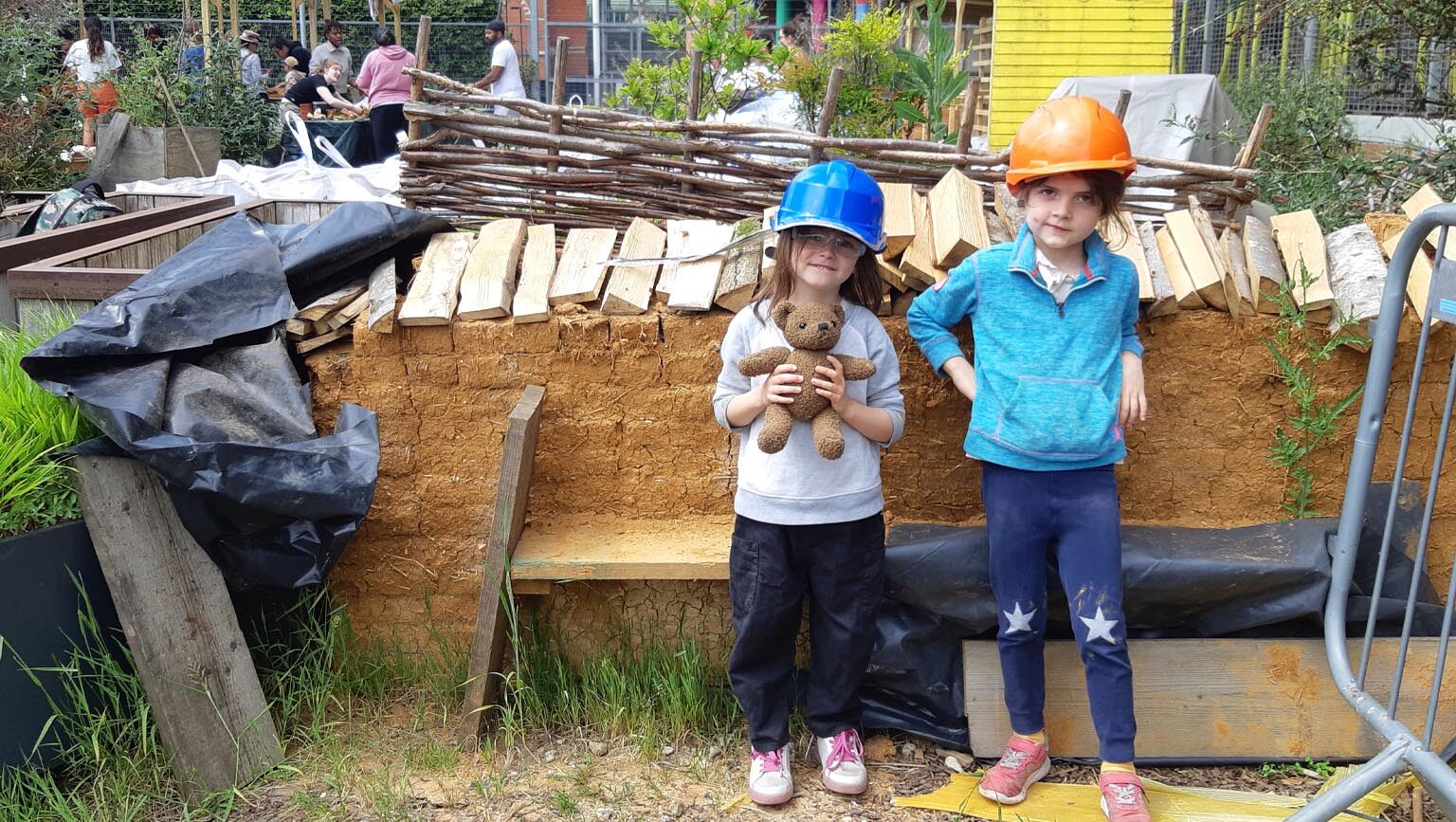
The ‘navvies’ of Chalk Farm: fist fights, rowdy pubs and raffling a dead body
Life was dangerous, drunken and relentlessly tough for the men who transformed the neighbourhood carving out the railways

From relocating those huge iron gasholders and turning them into flats, to carving a natural swimming pool in the middle of a working construction site, King’s Cross has boasted plenty of impressive showstopper projects as area gradually morphs from abandoned railway yards to world class, future-leaning neighbourhood.
And one of the perennials, to be found somewhere or other in this dynamic, ever-shifting urban landscape, has been the charity Global Generation, whose socially and ecologically-minded garden projects are beloved by anyone who’s ever stumbled upon them.
It was twenty years ago that the original idea for the Skip Garden – a necessarily portable organic food-growing oasis – first took shape upon the flattened industrial KX wastelands that were awaiting their long-promised regeneration.
“We’d started out seeing the redevelopment of this area in terms of the potential for including a lot of green roofs,” says Global Generation’s joint director Nicole Van den Eijnde, “but as our main focus has always been working with children and young people, that was complicated in terms of heath and safety.
“However, the timescale of the redevelopment of King’s Cross meant there were also going to be all these pockets of unused land for years to come, so we thought; is there an opportunity to use that land in a positive way? Could it bring a sense of community into a neighbourhood of change, where the long-term noise and upheaval can be quite difficult for people who’ve always lived there?”
In an early example of circular economy practice, the team set about “capturing people’s imagination with what you can do with waste.” Under the direction of the project’s founder, Jane Riddiford, and then head gardener Paul Richens, they explored ways to make a garden that was low impact and totally movable, settling on skips as planters, old water pipes for poly-tunnels and pallets and scaffold boards for herb gardens.
They approached The Guardian newspaper, which had recently moved in as anchor tenants at shiny new concert-hall-cum-offices, Kings Place. The paper’s chief exec had never seen anything quite like it – and was keen for them to be fully involved.
“We’ve always worked on the idea that the build of a garden, and its ongoing maintenance, presents an opportunity to get people together who otherwise would not usually meet,” says Nicole. “So the original Skip Garden was built by The Guardian’s senior management team alongside young people from the local secondary school (Regent High) and Argent’s construction workers. When you involve all those people, a different kind of ownership happens.”

We wanted to capture people's imagination about what you could do with waste
Nicole Van den Eijnde on setting up the Skip Garden


Alongside the many social and environmental benefits of their work, the overarching focus of the charity has always been an educational one. By demonstrating that crops could be grown in the harshest of urban environments – an active construction site! – the Skip Garden could teach and inspire locals to see their environment as a living entity, and engage with it accordingly.
The Skip Garden summarily moved about assorted temporary locations over the following years while remaining a constant local presence. It opened a café, hosted supper clubs featuring live music, ran craft workshops and plenty more.
“A lot of people think we’re just focused on gardening, and although that’s a big part of it, the work we do is much wider than that,” says Martina Mina, GG’s other joint director. “Our team consists of gardeners, educators, youth workers, carpenters, ceramicists, storytellers, weavers, artists, performers, urban designers, chefs, musicians, natural builders, archivists, architects, landscape designers, herbalists, community activists, a professional clown and much more.”
The biggest expansion of the concept was being given three years (later extended to five) to bring a garden to the large former St Pancras Goods Yard site, behind the British Library. This land, which bizarrely once saw a Harrier Jump Jet take off as part of an air race to New York, is earmarked for eventual redevelopment as the Library’s new Alan Turing Institute.
Always needing to keep one eye on finding the next site, Nicole, Martina and co. have since also set up a Floating Garden based on a canalboat moored up at the Granary Square steps and, despite having turned down multiple approaches by developers elsewhere in favour of keeping the charity’s roots deeply local, were finally tempted to set up a garden south of the river at Canada Water.
“We hadn’t planned that,” says Nicole, “but we felt it was an opportunity to see if the methodology and approach we use only works because of the unique set of circumstances around King’s Cross, or can it be applied in a different context?” So far, the experiment seems to be working out nicely.
“A lot of people think we’re just focused on gardening... but the work we do is much wider than that”
Martina Mina
The most unexpected development of the whole 20 years though, is the next iteration of the King’s Cross garden; at a permanent home on a triangle of land, with a fantastic 999-year lease, located back up on York Way and just opposite a couple of former Skip Garden sites on the Camden/Islington boarder.
“It is a unique opportunity to have long term peppercorn rent in the centre of the city and to be able to build a 1000-year vision,” says Martina, excitedly. “We want to use the triangle site to showcase what’s possible, so that more of these projects can happen where unused pockets of land can be reimagined and transformed into spaces for both environmental and social good. We want to demonstrate another way of building via our community build process, implementing different kinds of circular, sustainable and traditional building practices as well as different ways of planting, for example bringing in native hedgerow planting in the city or designing a food forest. It is exciting to have that permanence for ourselves, but even more so, is the idea that we can start conversations and show what’s possible, to inspire more of this activity in the future.”
It is testament to the impact that Global Generation has had, educating not just the borough’s young people, but also carrying the planners and other powers that be on the journey too, that such a forward-thinking use of the land is now being ushered enthusiastically into being.
“This land was always earmarked as a ‘habitat area’,” says Nicole, “but not one that would have been touched or accessed by many people. Our proposition, in terms of the climate and environmental issues that are happening all around us, is that if we can use it to get more people engaged – as a place of connection, questioning and becoming more aware – then the impact of that can be so much bigger than it sitting as an untouched natural space.”
As if to demonstrate this dynamic process in action, consultation with the residents of Somers Town over the public realm at the British Library’s extension saw requests for a permanent community garden when the Story Garden moves on. Now such a space is being included in the Library’s final plans for the first time.
By demonstrating the many advantages of having a social garden in the neighbourhood over recent years, local people have solid experience of what it can contribute to their lived experience. Global Generation’s gardens may be temporary, but their impact upon the King’s Cross environment is proving to be anything but.
All Camdenists should raise a glass to their last 20 years of green-fingered proudly local educational work – and here’s to the next 999, too.
Read all about Global Generation’s 20th anniversary and the exciting plans for the new Triangle site
Share your stories of interacting with the gardens over the years
Donate towards making the Triangle site a permanent reality

Life was dangerous, drunken and relentlessly tough for the men who transformed the neighbourhood carving out the railways

The King’s Cross educational charity just keeps on growing

As a new range of tees and merch celebrates the iconic label

Lust after the luxury flats or envy the industrial chic offices